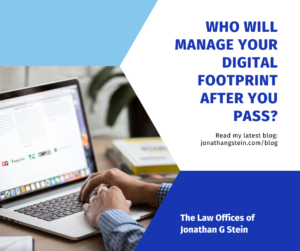 According to research, 69% of adults ages 50-64 are on social media regularly, and 50% of adults older than 65 are on some form of social media as well. However, in my experience as a California will lawyer, I’ve found that most people do not have a plan for what should happen to their growing portfolio of “digital assets” when they are gone.
According to research, 69% of adults ages 50-64 are on social media regularly, and 50% of adults older than 65 are on some form of social media as well. However, in my experience as a California will lawyer, I’ve found that most people do not have a plan for what should happen to their growing portfolio of “digital assets” when they are gone.
What is a Digital Asset?
Think of digital assets as anything you own online, including your email accounts, Facebook accounts, digital photos, music collections, and even cryptocurrency like Bitcoin. These assets need to be treated like you would any other asset in your estate plan or they stand the chance of being lost forever after your passing.
How to Plan for Digital Assets
First, begin by compiling a comprehensive list of all your digital accounts and provide those to your executor and/or trustee and estate planning attorney. Without giving the executor the authority to manage your accounts, they most likely will not be able to access them. Passwords and log-in credentials can be given to your attorney, when necessary, but do not include these passwords in the will itself, since all wills become public.
One thing that people forget to write down is the main password to their phone and computer. Accessing phones, computers, and their contents will be crucial to ensuring your entire digital footprint is protected. Alternatively, if you wish for your digital assets to be deleted or destroyed upon your passing, make sure to spell that out in your will or other estate planning documents so that your accounts are not accessed if the passwords do surface.
Don’t forget that some accounts accrue digital assets over time. Whether you have rewards points linked to your credit card, frequent flyer miles, or perks that are linked to an online gambling account, for example, you’ll want to take steps to make sure that these assets don’t go unclaimed when you pass away. A great way to prevent this from happening is to document the types of accounts you have that accumulate points or perks and leave the username and logins somewhere handy for your loved ones to find if something happens to you.
Another thing to consider is what you want to happen to any pictures, videos, blogs, or posts to social media accounts. Without granting your executor access to social media, years of photographs can be lost or deleted before your family can retrieve them. It’s not uncommon for people to now use Google, Facebook, or other cloud services to store family photos from the past. Do not allow your family’s history to be deleted; ensure your legacy is protected on and offline by creating a plan!
If you want to discuss protecting your digital footprint after your passing, now is the time. Call 916.247.6868, and schedule a consultation for you to take the next step.
